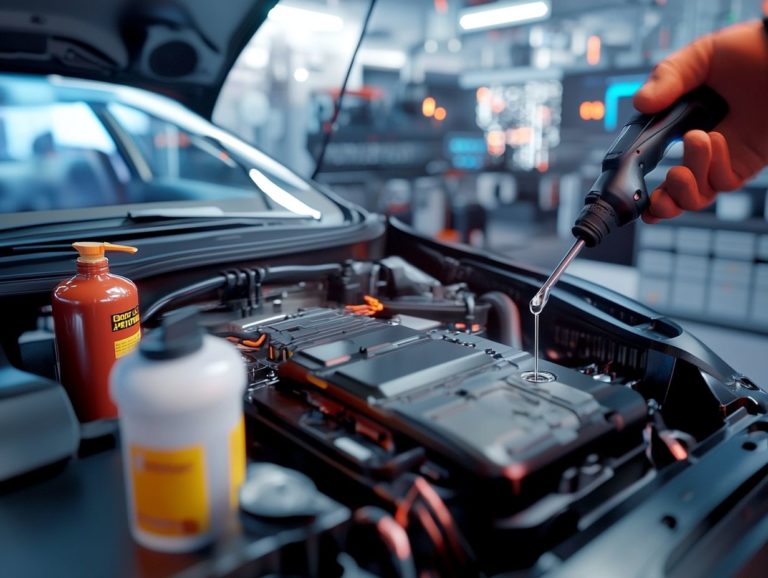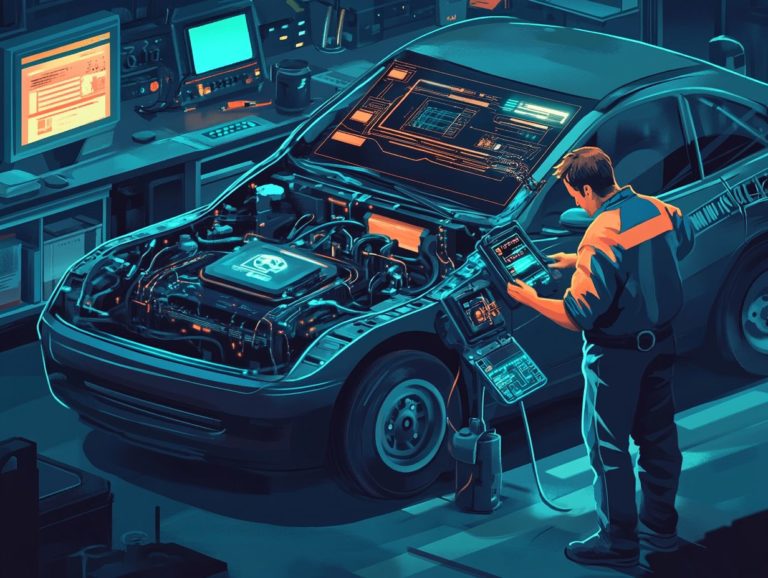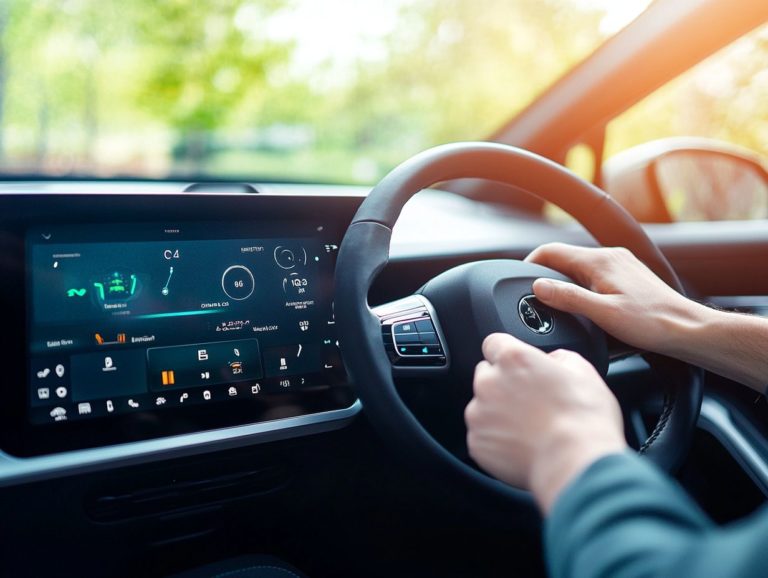Understanding EV Electronics and Maintenance
Electric vehicles (EVs) are revolutionizing transportation, and at the core of this transformation are EV electronics.
From batteries and motors to the essential components that enhance performance, grasping these systems is vital for any EV owner.
This article delves into the key elements of EV electronics, provides practical maintenance tips to ensure your vehicle runs at its best, and explores options for upgrading your system.
Whether you re just starting your journey into the world of EVs or you re a seasoned enthusiast, you ll find valuable insights here tailored just for you.
Contents
Key Takeaways:
- Understand the key components of EV electronics, including the battery and motor, to better comprehend how an electric vehicle functions.
- Regular maintenance is crucial for optimal performance and longevity of EV electronics. Don t wait until something goes wrong check your battery and electronics today!
- Upgrading EV electronics can improve performance, but it’s important to consider factors such as cost, compatibility, and warranty before making any changes.
What are EV Electronics?
EV electronics are essential to how well your electric vehicle works, which includes various important parts like high-voltage systems, battery packs, and electric motors. These components are meticulously designed to deliver optimal vehicle performance while minimizing energy consumption.
This network also supports the main functions of your electric vehicle, influencing everything from acceleration to power management. For both you as an EV owner and technicians, understanding EV electronics is vital, particularly when it comes to maintenance, upgrades, and understanding EV maintenance costs and the unique components that define these advanced vehicles.
As these elements work together in seamless harmony, they set electric vehicles apart from traditional gas-powered models. The integration of software updates has further revolutionized vehicle performance, enabling enhancements in efficiency and features well beyond the initial purchase. This underscores the necessity for you to stay informed about the latest advancements in EV technology knowledge that not only extends your vehicle’s lifespan but also supports sustainable transportation.
By comprehending the significance of EV electronics, you can make informed decisions that lead to a more rewarding and eco-friendly driving experience.
Components of EV Electronics
The components of EV electronics are essential to the functionality and performance of electric vehicles. Key elements such as the battery, electric motor, and regenerative braking systems each play a pivotal role, contributing to the distinctive operational capabilities that differentiate electric vehicles from traditional gas-powered cars.
Knowing how these parts work will blow you away and enhance your appreciation of the innovation driving the electric vehicle revolution.
Battery, Motor, and Other Key Parts
The battery pack and electric motor are among the most vital components of your electric vehicle, influencing everything from acceleration to energy efficiency and overall performance.
Lithium-ion batteries are the go-to choice for many manufacturers, thanks to their impressive energy density and ability to deliver power efficiently crucial for propelling that electric motor of yours. These batteries function within intricate high-voltage systems that manage the electric power in your vehicle, ensuring energy flows seamlessly throughout.
Regular battery care and maintenance, such as keeping an eye on charge levels and avoiding extreme temperatures, are essential for extending the lifespan of the battery and preserving its peak performance. By understanding how these elements work together, you can appreciate the importance of responsible usage and maintenance, ensuring your vehicle continues to run smoothly for years to come.
How to Maintain EV Electronics
To guarantee the longevity and optimal performance of your electric vehicle, meticulous maintenance of its electronics is crucial. This involves conducting regular checks on key components, including the battery, electric motor, and essential software systems, along with a solid grasp of understanding EV warranty and maintenance.
Prioritizing these tasks will ensure your EV operates at its best for years to come!
Tips for Optimal Performance and Longevity
To achieve optimal performance and longevity from your electric vehicle, it’s essential to embrace best practices for battery maintenance, stick to recommended service schedules, and be conscious of your driving habits.
Regularly checking your dashboard alerts can help you catch potential issues before they escalate, ensuring your battery remains in peak condition. Familiarizing yourself with recommended maintenance intervals, such as periodic software updates and battery inspections, can enhance your vehicle’s reliability.
Adopting smoother driving techniques, like gradual acceleration and deceleration, can ease the strain on your battery. By planning your trips with charging options in mind and avoiding extreme temperatures, you can maximize your battery life and improve efficiency, leading to a more enjoyable driving experience.
Common Maintenance Issues and Solutions
Electric vehicles, like any other mode of transport, may encounter common maintenance issues that deserve your attention. These concerns can include battery degradation, cooling system malfunctions, and the necessity for regular brake checks and tire upkeep.
These issues can stem from various factors, including wear and tear over time or environmental conditions. Keeping a vigilant eye on the cooling system is crucial; it regulates battery temperature and ensures smooth operation, helping to prevent overheating.
Maintaining proper tire pressure not only boosts performance but also enhances efficiency, ultimately extending your vehicle’s range. Regular inspections of the brake system are equally important for safety and proper handling. Proactive maintenance is essential to avoid costly repairs and maximize your vehicle’s lifespan.
Upgrading EV Electronics
Upgrading the electronics in your electric vehicle can lead to remarkable performance enhancements. Doing so can boost the efficiency of both the electric motor and the charging systems, ensuring your vehicle stays ahead in technological advancements.
This proactive approach can transform your driving experience and maximize the potential of your electric vehicle.
Options for Improving Performance
Performance upgrades for your electric vehicle can include software updates, enhancements in battery management, and modifications to power systems, all designed to maximize the efficiency and responsiveness of the electric motor.
These upgrades are essential in refining your overall driving experience. Optimizing battery management systems can lead to longer ranges and faster charging times, making long-distance trips more convenient. Fine-tuning power systems can enhance power distribution, leading to improved acceleration and handling.
Regular software updates are vital for boosting performance and addressing security vulnerabilities, ensuring that safety features operate correctly. Staying informed about these upgrades can significantly enhance your vehicle’s reliability and efficiency, allowing you to enjoy a smooth ride while keeping safety front of mind.
Considerations for Upgrading EV Electronics
When considering upgrading your EV electronics, assess compatibility, the potential impacts on vehicle performance, and the importance of technician training and safety testing during the upgrade process.
Your success in enhancing electric vehicle functionality largely depends on these aspects. Ensuring new components integrate smoothly with existing systems not only maintains the vehicle s integrity but also boosts overall efficiency.
Technicians with specialized training are essential; their expertise can help avoid costly mistakes during installation. Adhering to recognized safety testing standards is also crucial, ensuring that modifications keep your vehicle’s operation secure and compliant with regulations.
By carefully considering these factors, you can enhance the reliability and effectiveness of your performance upgrades, leading to a more enjoyable driving experience.
Watch this video for an overview of essential maintenance tips and upgrades for your electric vehicle.
Frequently Asked Questions
What is meant by EV electronics?
EV electronics are the electronic components and systems in an electric vehicle. They control and manage functions like motor control, battery management, and charging.
Why is understanding EV electronics important for maintenance?
Understanding EV electronics is important for maintenance. It helps owners and technicians identify and fix issues, ensuring the vehicle performs well and lasts longer. For more insights, check out understanding EV regulations and maintenance.
What are some common types of EV electronics?
Common types of EV electronics include motor controllers, power electronics, battery management systems, and charging systems. Each component plays a critical role in how the electric vehicle operates.
How often should EV electronics be maintained?
The maintenance frequency for EV electronics varies by make and model. It’s recommended to follow the manufacturer’s maintenance schedule, which includes regular check-ups and understanding EV maintenance myths as part of keeping your vehicle in optimal condition.
Can I perform maintenance on EV electronics myself?
It’s not advisable for untrained individuals to perform maintenance on EV electronics. These systems can be complex, so don’t risk your safety; instead, refer to what are the maintenance needs of EVs and let a trained technician handle maintenance and repairs.
Are there any potential safety concerns with EV electronics?
There are potential safety hazards with EV electronics, as with any electronic system. Electric vehicles undergo rigorous testing and have safety measures in place, and regular maintenance can help prevent safety issues.
Stay informed about your EV’s electronics and schedule regular check-ups with a qualified technician.





